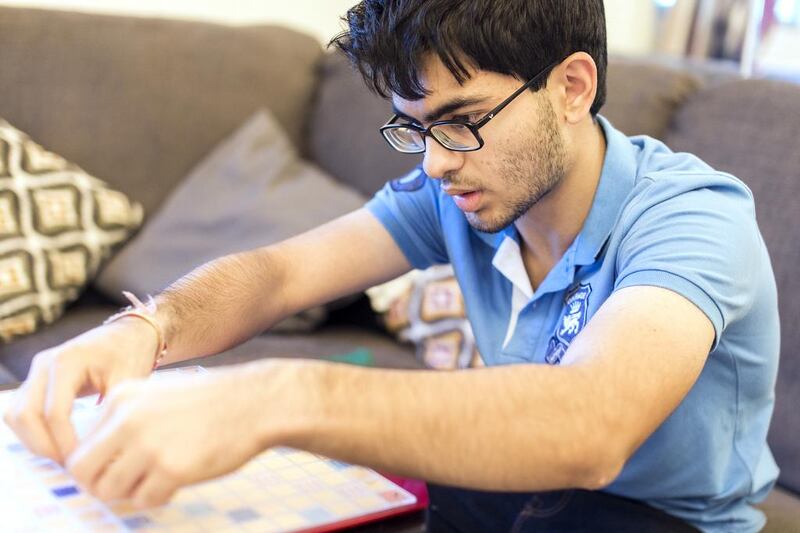Dubai’s teenage Scrabble prodigy, Sanchit Kapoor, is a young man of many words.
After clawing his way up the tournament’s rankings for six years, the 16-year-old wunderkind finally won the World Youth Scrabble Championship in Lille, France, this summer.
“It’s been a dream that I’ve had ever since I played [at the World Youth Scrabble Championship] in 2013, when I first finished in the top 10.
“I knew that I could possibly win it and that I had time, but I also knew that I had to improve my word gameplay,” says the GEMS Modern Academy student.
Kapoor first competed in the tournament in 2011, in Malaysia, where he finished in 53rd place. Hooked, he competed every subsequent year, working his way up to 18th place in 2012 and, impressively, finishing in the top 10 three years in a row, before finally being crowned world champion.
“I just felt very relieved to have finally won, because this is probably going to be my last year,” he says.
Kapoor’s mother first introduced him to Scrabble when he was about 8. He immediately fell for the “basic mathematical side” and, as it turned out, he had an affinity for “studying words and etymologies, and encountering new words”.
Nikhil Soneja, Kapoor’s coach and chairman of the UAE Scrabble Club, discovered the young master at a Mattel scrabble tournament that he was judging in Zabeel Park in 2010.
The 38-year-old has played the game competitively for almost 25 years; himself a top-10 ranked player in the Gulf, Soneja began playing in Bahrain, which hosted the Gulf Scrabble Championships until 2009 when the regional tournament moved to the UAE.
He attributes Kapoor’s success to a love of the game and sheer determination.
“I remember, in his first year, Sanchit actually made it his goal to learn the 1,000 most probable seven letter words, and that’s something that’s really self-driven.”
The tournament, says Soneja, is intense – with participants playing up to eight or nine hours a day, for three days. “From what I’ve seen with kids who play Scrabble, they really have to be brilliant all-rounders.
“It’s not enough to just have a knowledge of words. They have to be good at maths; they have to have the right patience; they have to have the right temperament.”
What’s even harder than getting to the top is staying power, he adds. It requires great focus and concentration to win consistently over the three days of a tournament.
Aside from learning physics, chemistry, maths and English at school, Kapoor is also studying computing and hopes one day to work in IT.
The wordsmith studies programming at school and learns Java, Python, HTML and CSS scripts in his spare time. He also plays on the school football team, and competes in debates and quizzes.
With his time increasingly taken up with schoolwork, UAE Scrabble Club meetups have grown infrequent, and Kapoor now mostly practises Scrabble alone.
One of the most useful tools at his disposal is a computer program Zyzzyva, a word-learning software named after a weevil, that’s also a very high-scoring Scrabble word. Crucially, Zyzzyva allows users to search useful words by patterns and length.
In 1938, the American architect Alfred Butts invented Lexiko, which was sold commercially as Scrabble in 1949. Butts created a set of letter tiles with varying point values that he worked out by analysing the frequency of letters used in words on the cover of The New York Times. Today players pit their knowledge of words with high-scoring letter combinations, many of which are not in common usage but must be listed in the Scrabble tournament bible Collins Scrabble Words.
Serious Scrabble players learn words not by meaning but utility, says Soneja. “You try to learn words that are more probable in terms of combinations.”
Having finished his sixth year of competition, Kapoor says preparing for the Championship is more about “changing gears”, into a “Scrabble mindset”, as they grow nearer.
“This year, I was very fortunate to have this tournament happen at the end of the summer holidays, so I had the entire summer holiday to devote to it – and some college applications.”
Even with all his hard work in preparation, actually winning this year’s competition was no mean feat.
By the start of his last match, Kapoor had already won. “When you get closer to the end of a game, you have to plan it out more; you have to think more strategically – he’s really gotten good at that,” says Soneja.
Many of those who have finished in the top 10 in the past few years were younger than Kapoor was at his first competition.
Ultimately though, Kapoor’s experience counted. “I really think that some of the games that came down to the wire went my way because of sheer experience,” he says.
Soneja wishes the world championships were around when he was a child. “I’m not sure I would have ever gotten to Sanchit’s level,” he says with a laugh.
“But, it’s great for these kids that they have this [tournament] where they can compete and interact with people of their own age and at the same stages in life. Other than Sanchit, some of those kids are the most intelligent I’ve seen in the world, so it’s really something else.”
Hareth Al Bustani is a features writer at The National.





